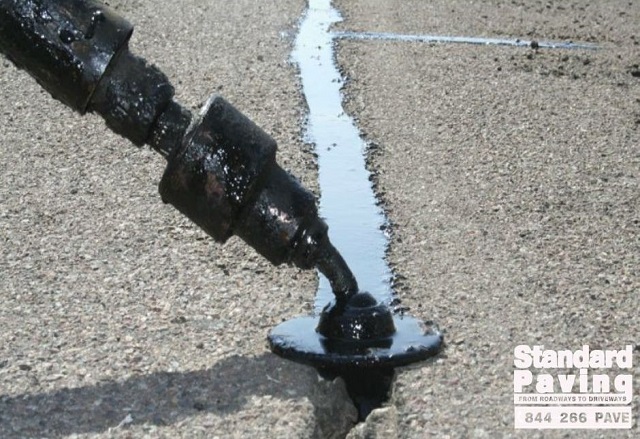There is no doubt that asphalt driveways are very durable and long-lasting. However, exposure to elements, excessive constant weight on them, natural disasters, and aging can cause them to crack up. Also, when asphalt driveways start developing cracks, it is time for maintenance and repair work to begin. High-quality paving installations are designed to last two decades or more.
Proper maintenance is required to enable a long lifespan. Also, when left unchecked, asphalt driveway cracks can extend and encompass the whole pavement. These are best treated fast eliminating their chance of extending. Also, preemptive measures can help stop asphalt pavement cracks from forming in the first place. Here’s what you need to know about how to keep cracks away in detail:
The Need for Regular Inspection and Maintenance
Regular inspection is the key to keeping your asphalt driveway crack-free for longer. So, inspect your asphalt driveway regularly and look for signs of cracks, potholes, or other damage. It is important to look for all these issues and any others to treat them promptly. Address any issues promptly to prevent them from worsening over time. Schedule routine maintenance such as seal coating and crack filling to protect the surface and prolong its lifespan. Do not compromise on repairs and maintenance of your pavement.
Proper Installation Is Necessary
The very first step you need to take is to ensure high-quality pavement installation. So, this begins by selecting the right asphalt driveway contractor. Ensure that your asphalt driveway is installed by experienced professionals using high-quality materials. Allow proper time for project completion and grading to achieve a smooth and stable surface that can withstand the elements. Invest in professional installation to minimize the risk of future issues. Get the installation right to keep cracks away for longer.
Effective Drainage to Remove Excess Water Quickly
Poor drainage can cause excess water to stay on the driveway surface for longer. Also, it is a common cause of driveway cracks. Rainwater and melting snow water can get into the underlayers disrupting the adhesives quicker than they should. So, ensure that your driveway is properly graded to allow for adequate drainage away from the surface. Also, consider properly installing drainage systems to divert water away from the driveway and prevent pooling. Make sure they are unclogged at all times.
Regular Sealcoating to Keep the Surface Together
Sealcoating is a preventative maintenance technique that keeps asphalt pavements as good as new for much longer. It helps protect asphalt driveways from moisture, UV damage, and other environmental factors. Also, seal coating improves the aesthetic as well. Apply a high-quality sealant to the surface of your driveway every few years. It will create a protective barrier that seals out water and prevents cracks from forming. Sealcoating also helps enhance the appearance of the driveway and prolong its lifespan.
Prompt Crack Filling Without Any Delay
Small cracks might start forming in a few years or even quicker depending on the use. Also, climate, ground situation, natural disasters, and excessive rain or snow can accelerate cracks forming on asphalt pavements. However, leaving them unchecked is a crucial mistake. So, make sure to get proper crack filling for your driveway as soon as you see the first signs. Professional asphalt driveway contractors will use high-quality crack sealants to fill them in and stop them from extending and worsening.
Avoid Heavy Loads in the Same Spots
Excessive weight and pressure can put stress on the asphalt surface. Also, these factors can contribute to the formation of cracks. Additionally, excessive weight in the same spots can cause surface indentation. So, avoid parking heavy vehicles or placing heavy objects such as dumpsters or equipment on the driveway for extended periods. Distribute weight evenly to minimize stress on the asphalt surface and reduce the risk of cracks forming. Park heavy vehicles at different spots where possible.
Protective Measures for Pavements
Protective measures and precautions are necessary to stop cracks forming on asphalt pavements. Place protective mats or boards under car tires during hot weather to prevent tire marks and indentation. Also, clean tire marks and other stains regularly to not let your asphalt driveways look filthy and develop unwanted color tinting. Avoid using sharp objects such as snow shovels or metal-edged tools on the surface, as they can cause gouges and scratches. Remove debris and keep it clean at all times.
Educate Yourself
Finally, take the time to educate yourself about proper driveway maintenance practices. Also, learn more about potential warning signs of damage. Learn how to identify early signs of cracking or deterioration. Do not ignore these signs and take action to address them promptly. Stay informed about the latest advancements in asphalt maintenance techniques and products to ensure that you’re using the most effective strategies for protecting your driveway. Only when you know better can you act faster.
Bottom Line
Cracks are almost inevitable for asphalt pavements. However, they can speed up depending on factors like climate, ground situation, natural disasters, and ignorance in maintenance. Also, proper maintenance including repairs, seal coating, and other preemptive measures can slow down cracks as well. These precautions stop cracks from forming and even stop them after they have started to form. Avoid heavy loads in the same spots and get professional crack filling as soon as you see the first signs. These tips will make your asphalt pavements last more than two decades.
Stay in touch to get more updates & news on Gossips!




